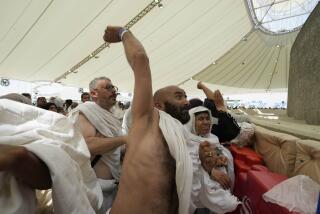Deadly violence shatters Eid al-Adha calm in Iraq
- Share via
BAGHDAD — A suicide bomber edged his way into a crowd of Iraqi officials and U.S. forces gathered for a meeting north of Baghdad on Thursday, killing as many as 12 people, including an American soldier.
It was one of three attacks nationwide that shattered what had been the peaceful start of the Muslim holiday of Eid al-Adha, which began Wednesday for Sunni Muslims. Shiites begin celebrating the four-day holiday today. The violence included a bombing in central Baghdad that targeted a row of liquor stores and, police said, killed three Iraqis.
The violence underscored what a U.S. official called the “great security threats” still looming in Iraq, threats further illustrated by two recent discoveries.
In Diyala province, north of Baghdad, Iraqi civilians tipped off U.S. forces to a gruesome torture chamber, with chains on the walls and ceilings and a bed on which chained victims apparently were subjected to electrical shocks.
And south of Baghdad, the U.S. military said it found an elaborate system of tunnels dug by insurgents along the Euphrates River. The militants apparently used the tunnels as hiding places and as positions from which to fire on U.S. forces. Soldiers from the Army’s 3rd Infantry Division, which found the tunnel system, used two bombs to destroy it.
The discoveries occurred in areas still plagued by Sunni Arab insurgent activity blamed on the group Al Qaeda in Iraq. Troops came across the tunnel network Sunday during a search that also uncovered a cache of bomb-making equipment in Iskandariya, 25 miles south of Baghdad. The torture center was discovered in Muqdadiya, 60 miles northeast of Baghdad, after a tip from local Iraqis. The remains of 26 people also were discovered at the compound, which was uncovered during a series of operations this month.
A military statement said 24 insurgents were killed during the three-day mission.
“There are still great threats out there,” said a U.S. Embassy official who asked not to be identified. “Each attack illustrates that.”
The bloodiest attack Thursday occurred in Kanan, about 12 miles east of the Diyala provincial capital of Baqubah. The U.S. military said a bomber wearing an explosives vest approached a building where a local council meeting was about to take place. Several U.S. soldiers were standing outside the building, according to a military statement.
The statement said one American soldier and at least five Iraqi civilians were killed, and that 10 U.S. troops and an Iraqi military translator were injured. An unidentified Diyala police official put the death toll at 12. He said initial reports indicated that the dead included a “prominent leader” of the so-called Awakening Council of local sheiks who have joined forces with U.S. and Iraqi troops against insurgents.
It is not unusual for U.S. and Iraqi officials to have different casualty numbers, and there was no way to determine which was correct.
Also in Diyala, police said gunmen opened fire on a patrol of Iraqi police and volunteer security guards working alongside U.S. and Iraqi forces. The police official said one policeman and two security volunteers were killed.
Such security guards, who are often referred to as concerned local citizens, number in the tens of thousands and are paid about $10 a day by U.S. forces. They frequently are targeted by insurgents.
In Baghdad, police said three people died when a car bomb exploded on a busy shopping street outside a row of liquor stores.
After the fall of Saddam Hussein in 2003, liquor stores came under attack from religious extremists, and most closed. In recent months, a decline in violence has prompted some liquor stores to reopen.
“The explosion was very huge,” said Chassib Hamad, a parking lot attendant who was injured in the blast. He said one liquor store owner, whom he called Abu Toma, had told him he planned to keep his shop open during Eid because he expected a big increase in business, and because he had been feeling safer lately.
Hamad said Abu Toma’s shop was damaged and that the shopkeeper was among those hurt. Police said nine people suffered injuries.
In the western province of Anbar, the stabbing death of an Iraqi policeman during a fight with a U.S. Marine threatened relations between U.S. forces and Sunnis in the former insurgent stronghold. A police officer in Ramadi, the provincial capital, said about 400 people protested the killing with a brief street demonstration Thursday. They called for the Marine to be put on trial for the Iraqi’s death.
The incident took place Monday, and the U.S. military has said it is under investigation.
Marines stationed in Ramadi have developed close relations with Sunni tribal leaders in the city, which until a year ago was a haven for insurgents. The tribal chiefs’ decision last year to reject insurgents and work with U.S. forces is credited with helping curb violence elsewhere in Iraq.
--
Special correspondents in Baghdad, Baqubah and Ramadi contributed to this report.
More to Read
Sign up for Essential California
The most important California stories and recommendations in your inbox every morning.
You may occasionally receive promotional content from the Los Angeles Times.














